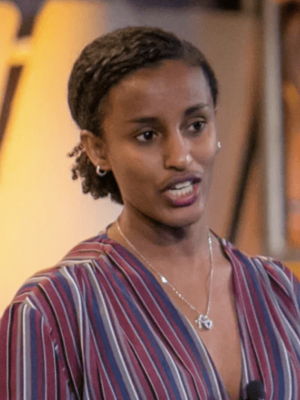Rediet Abebe facts for kids
Quick facts for kids
Rediet Abebe
|
|
|---|---|
 |
|
| Born | 1991 (age 34–35) |
| Alma mater | |
| Awards |
|
| Scientific career | |
| Fields | |
| Institutions | |
| Thesis | Designing Algorithms for Social Good (2019) |
| Doctoral advisor | Jon M. Kleinberg |
Rediet Abebe is a brilliant computer scientist from Ethiopia. She was born in 1991. She works with algorithms and artificial intelligence (AI). These are like the "brains" behind computers and smart devices. Currently, she is a professor at the University of California, Berkeley.
Her special research looks at how computers and AI can help make things fairer for everyone. She studies how to use math and computer tools to understand and reduce unfairness in the world. Rediet also helped start two important groups: Mechanism Design for Social Good (MD4SG) and Black in AI.
Contents
Early Life and School
Rediet Abebe was born in 1991 in Addis Ababa, Ethiopia. She grew up in this vibrant city. She first attended Nazareth School, following the Ethiopian National Curriculum.
Later, she won a special scholarship. This allowed her to attend the International Community School of Addis Ababa for high school.
Rediet then went to Harvard University. There, she earned a degree in mathematics. She also got a master's degree in applied mathematics. During her studies, she wrote research papers on math, physics, and public health. She also wrote for The Harvard Crimson newspaper. She focused on local school systems.
After Harvard, she studied at the University of Cambridge in England. She earned another master's degree, this time in pure mathematics.
She completed her highest degree, a Ph.D., at Cornell University. Her Ph.D. was in computer science. Her important research earned her several awards. She was the first Black woman to get a Ph.D. in computer science from Cornell.
Making AI Fair for Everyone
Rediet Abebe's research focuses on making AI and algorithms fair. She wants to ensure these powerful tools help everyone. Her work looks at how AI can address problems in communities that don't always get enough help.
Her interest in fairness and computer science grew from her experiences. These included her education in Ethiopia and observing local school systems. She saw how unfair computer designs could cause problems for people.
In 2019, Rediet joined a special group for the National Institutes of Health. This group included other top AI experts. They worked together to create ideas for how AI could be used responsibly.
Also in 2019, Rediet became a Junior Fellow at the Harvard Society of Fellows. This was a big honor. She was the first Black computer scientist and the first female computer scientist to join this group.
Rediet is now a professor at the University of California, Berkeley. She teaches and researches in computer science. She is the first Black female professor in her department's history. She is also the second in the entire College of Engineering.
She is part of several important research groups at Berkeley. These include the Berkeley Artificial Intelligence Research Lab (BAIR). She also leads her own research group, BEAAMO. This group studies fairness and access in algorithms.
Mechanism Design for Social Good (MD4SG)
In 2016, Rediet Abebe co-founded a group called Mechanism Design for Social Good (MD4SG). She started it with Kira Goldner. This group brings together experts from many fields. They use algorithms and special design methods. Their goal is to solve problems related to unfairness.
MD4SG holds yearly meetings. These meetings bring researchers together. They share ideas on how to use algorithms to help society. In 2021, Rediet also helped start a new conference. It focuses on fairness in algorithms.
Rediet was recognized as a pioneer for her work with MD4SG. She was named one of MIT Technology Review's Innovators Under 35 in 2019. Her Ph.D. research also won awards. It helped create the foundation for this important new field.
Black in AI
Rediet Abebe also co-founded Black in AI in 2016. She started it with Timnit Gebru. This group is a network of many researchers. They all work on AI.
Black in AI holds yearly workshops. These events help researchers connect and work together. Rediet led the Academic Program for this group. For this work, she was recognized in the 2019 Bloomberg 50 list.
Awards and Recognitions
Rediet Abebe has received many important awards for her work:
- 2018: Named "One to Watch" by Bloomberg 50.
- 2018: Received the Harvard-Cambridge Fellowship.
- 2019: Became a Junior Fellow at the Harvard Society of Fellows.
- 2019: Recognized as one of MIT Technology Review's Innovators Under 35.
- 2020: Won the ACM SIGKDD Dissertation Award.
- 2020: Received an honorable mention for the ACM SIGecom Dissertation Award.
- 2020: Awarded the Innovation for Equity, Rising Star Award.
- 2020: Named one of the "100 Most Influential Young Africans."
- 2022: Became an Andrew Carnegie Fellow.

